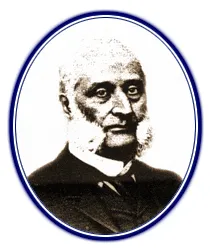Mr. Joseph Horne and His Legacy
By Abby Mendelson
Born in Bedford County on a brilliantly cold day in January 1826, Joseph Horne was the son of a stern and distant Bavarian father who had emigrated to the New World some 50 years earlier. Henry Horne, who had served with distinction in the Continental Army, had hoped his son would become a physician and had even enrolled young Joseph in the Bedford Classical Academy with that goal in mind.
Preferring to the rough and tumble of trade and making a profit, Joseph quickly outgrew Bedford and moved west to Pittsburgh, at first working for a tradesman named Yeager, then moving on to a merchant of note, F.H. Eaton. Quickly, Master Eaton noted the young man's head for business, facility at trade, and easy and gracious way with his customers. Almost overnight, young Joseph became Master Eaton's partner. By 1849, Joseph bought out the older man and renamed the business The Joseph Horne Company, a name it would proudly bear for more than 130 years.
Mr. Joseph Horne was just 23 years old at the time.Headquartered at 77 Market Street, the store's first specialty was wholesale millinery, perfect for an age when women either made their clothes or employed seamstresses who did. Mr. Horne presided over three floors, 18 by 60 feet, a basement, and 11 employees, had deliveries made in a wheelbarrow, and greeted customers at the door. Soon, he joined forces with Messrs. Shea and Burchfield, whose distinguished families intermarried and entered the business. He brought a daughter to his emporium that has never been equaled in Pittsburgh.
It is not surprising, then, that, fast-forwarding 30 years to 1881, we find the company so prosperous that Mr. Joseph Horne required his own new signature building at Wood and Liberty.
Shortly thereafter, in 1886, he took the step that would cement his fortune and immortalize his name: he expanded to include retail. Running two operations—retail in the old Liberty Hall building on Penn Avenue and wholesale at Wood and Liberty—proved too difficult, so in 1891, at age 65, he sold the wholesale side to the Pittsburgh Dry Goods Company.Reigning over Pittsburgh commerce for nearly 50 years, a patrician gent with deep white muttonchop sideburns, Mr. Joseph Horne, set the tone- proper, Teutonic, precise. His merchandise was the best, his clerks patrician, and his clientele was nothing less than the lords and ladies of the Pittsburgh landscape. A patron of charities too numerous to mention, he was also a benefactor of the Methodist Episcopal Church and West Penn Hospital and a trustee of the Western University of Pennsylvania, as Pitt was then called.
Husband to two wives, Mary Elizabeth Shea and Emma Galway, he sired numerous children, some of whom, like son Durbin, born in 1854, followed Mr. Joseph Horne into the business. (Durbin, the second Horne to preside over the business, became president in '01 and passed away in 1916. He was succeeded, in 1946, by his son Joseph, the last Joseph Horne to head the company, which he did until his passing, when he was unmarried and childless, two years later.)
Always a stickler for details, in 1892, Mr. Joseph Horne was busily working on plans for the stunning new Penn Avenue store that would be his company's flagship when he passed away. The store, subsequently built by his family and partners, became his monument.